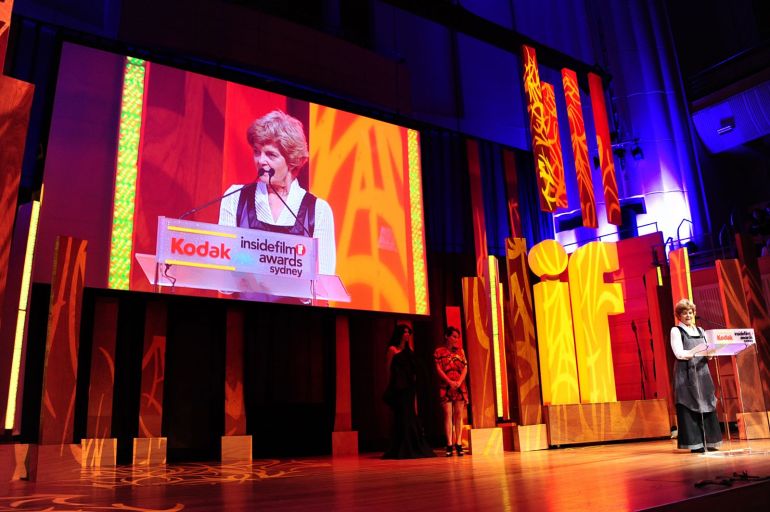Producer Penny Chapman likes to keep busy. The fruit of her diligence is a prolific, 25-year career in film and television that includes the likes of Brides of Christ, Blue Murder, RAN: Remote Area Nurse and the AFI Award-nominated children’s drama My Place.
“A lot of them looked at our cultural history, and tell us something really intriguing about it,” Chapman observes of these highlights from her stellar career. “I am drawn to history, to anything that explores where we’ve come from and helps explain where we are.”
In November, Chapman won the inaugural IF Award for Contribution to Television, coming in ahead of the likes of Andrew Denton, Rob Sitch and Kim Williams. Not bad for a woman who, as a political science honours student half a lifetime ago, never imagined she would end up a revered elder stateswoman of the Australian TV industry.
“I’ve had a completely dilettantish life,” she admits. “What I really loved was theatre. I was intrigued by performance culture. And I’ve always had enormous regard for writers, and over the years I’ve developed a love of the craft of writing.”
This was heightened during a stint as coordinator of Writers Week at the Adelaide Festival in the 1970s. Today, Chapman’s regard for writers underpins her work.
“Writing is the fundament of what we do. So whenever you come across a writer who’s capable of turning an image, a concept into something beguiling … You marvel at what people have managed to create.”
Chapman gets excited whenever she encounters young talent budding within the industry. She rattles off names such as David Michôd (Animal Kingdom), producers Cecilia Ritchie (The Road to Success) and Michaela Perske (Boxing for Palm Island), director Luke Eve (Dave in the Life Of) and writer Emily Ballou (The Cooks).
“What excites me is the talent that’s wanting to work in television. Over the last ten years television has become a much more interesting place, a much more interesting market, as really creative people see television as a way of creating longer-form storytelling.
“Now, that’s because the feature film market has become harder and harder, but I love the fact that there’s HBO, the Madmens of the world. People who in the past would not have deigned to work in television now see it as a marvelously rich, generative place to be.”
This, she feels, also reflects greater sophistication among television audiences.
“People have become so much more visually literate. The visual and aural language we’ve developed is more sophisticated, much wilder, much less linear, more oblique. Many, many more things are possible. Rules have been chucked overboard. It’s really exciting.”
Chapman marvels at the technological changes she has witnessed during her quarter-century in the industry. Technology has “simplified the way we communicate” and made it easier for “anybody with half a creative brain” to create and distribute content.
The downsides are self-evident: “You can no longer be very definite about how you’re going to finance programs. The market has become much more fluid, so you can’t easily define where the revenue is going to come from. You’ve got to be much more nimble.
“The good thing about that is that we’re no longer operating in such isolated silos. Producers have had to strategically align with each other much more,” Chapman says, evoking the philosophy behind her own company Matchbox, which she formed with fellow producers Tony Ayres, Michael McMahon Helen Panckhurst and Helen Bowden.
“I get a sense when I talk to young filmmakers these days that they know, admire and are more connected with each other and each other’s work. There’s more encouragement. Much less competition, much more cooperation and mutual enablement. We’ve got a much stronger sense of creative community, rather than just industry.”
Chapman and Matchbox have a hectic slate of projects on the go. Along with AFI Award-nominated children’s drama My Place and an eight-part adaptation of Christos Tsiolkos’ The Slap, forthcoming highlights include Victoria Pitt’s political documentary Leaky Boat and a documentary series for SBS with the working title Sex: An Unnatural History.
Add to the list The Straits – a crime drama series about a family of smugglers in the Torres Strait based on and idea from Torres Strait Islander actor Aaron Fa'aoso (East West 101) – and children’s drama The Lost Boys, in addition to a range of projects in development, and it’s clear that Chapman is going to be busy, as always.
She wouldn’t have it any other way. “I think I’d open a vein if I was to stop work.”
This article originally appeared in IF magazine #138 (Dec 2010 – Jan 2011). Subscribe to the magazine here.
Penny Chapman accepting the IF Award in 2010.


